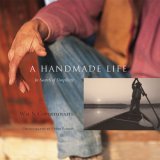Here’s another article I wrote for Suite101.com, the copyright of which passed to me so I can share it with you here.
It’s of William S. Coperthwaite’s book A Handmade Life, In Search for Simplicity. It was one of the first books I read after making my turn-around regarding a Simpler Life in a Better Future, and it influenced me tremendously. I reread this book every few months now (it’s not too long and has some beautiful photographs). Rereading it is a great grounding experience for me.
I wrote a couple of reviews of it and this one was the general review.
- The author
The author of A Handmade Life, In Search for Simplicity, William Coperthwaite, is a philosopher and anthropologist, and a designer of social as well as material constructions. He is a scholar – he has a Ph.D. in education from Harvard – and a teacher, albeit an unorthodox one. But he is foremost a physical kind of man, a skilled craftsman who built his own home and chops his own wood at his homestead in Maine, most accessible by canoe.
Though Coperthwaite lives “off the grid†– buying almost nothing, reachable only via mail to the local library – his sustainable living experiment is not an “exit strategyâ€. He welcomes visitors, travels to learn from other cultures, and is available for lectures and yurt-building workshops.
And of course he reaches out to all of us in his book, A Handmade Life, published by Chelsea Green in 2002 and newly out in paperback.
- The Democratic Axe (and Chair)
A Handmade Life has something of everything, but most importantly, it has hope. Though there is critical and honest analysis of a world in crisis, this is not a doomsday book. It has recipes for a better community – of humans and nature – that Coperthwaite himself has put to the test in over four decades.
“My central concern is encouragement,†he writes. He is reluctant to be called a teacher, but it is true that his most inspired writing evolves from his desire to better our lives. Still, like the best of teachers, he gently offers us the skills and tools for making better lives ourselves.
This he calls “democratic†and it is his greatest gift to us: the message that a fulfilling life is up to each of us – not big corporations, big government – and that we can do it.
But do what? Preserve not things but the skills to make things, and the skills to make the tools to make things. And work. With those we can emancipate ourselves from machinery, mindless consumption, and unhealthy, unnatural and asocial lifestyles.
- Hand–made
This brings us to the keyword in the book’s title: Handmade. A “handmade life†is centered on “bread workâ€, that is, physical labor. Sounds unappetizing? Coperthwaite is convincing when he pleads for reintroducing work into our lives and even the lives of our children, and promises that it is the only foundation for a healthy body and a happy mind.
Thus the book seamlessly combines philosophy and reflection with how-to-build inserts on “The Democratic Axeâ€, “The Democratic Chair†and handmade toys. And let’s not forget the “Democratic Houseâ€: the yurt. It is a house you can build yourself, with your hands, at a small cost to your wallet and to nature. It is beautiful and long-lasting, as are all the tools, objects and lives that Coperthwaite promotes.
That said, this most inspiring heart of Coperthwaite’s work is also his weakest spot. In his desire to promote it, he can’t help but generalize the individual handmade life to a social level. In this he is less convincing. In the sections on the social distribution of work and pay, for instance, the book loses its marvelous exemplary quality and slips into abstract, redundant theorizing. Such social theorizing or “designing,†as Coperthwaite calls it, is out of place in this book. Luckily there are only few such lapses.
- A simple beauty
The beauty of A Handmade Life lies in simplicity as its subject, method and presentation. Coperthwaite is a man of words both small – “I want to live in such a way that small gifts are meaningful†– and big – “We need poets who can discover and proclaim the beauty of simplicity while themselves living a simple, rural life of creative and honest laborâ€. But he makes sure that both kinds are democratic words that all of us can choose to use and apply to ourselves.
Peter Forbes’ stunning photographs documents Coperthwaite’s life and desire: a couple of hand-carved, curved spoons, Coperthwaite carrying a toddler, guiding his canoe.
Those interested in the Simple Life of Helen and Scott Nearing and the teachings of non-violence of Richard Bartlett Gregg will find Coperthwaite a thoughtful interpreter.
Sections of this book appeared in Manas and Mother Earth News. It is printed on recycled paper.

Leave a comment